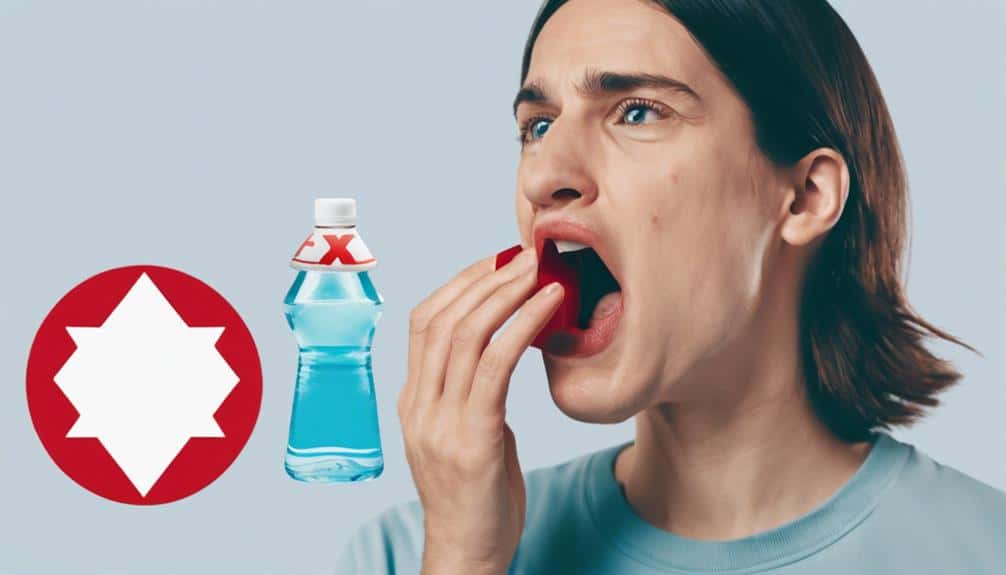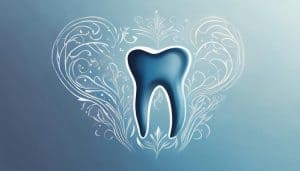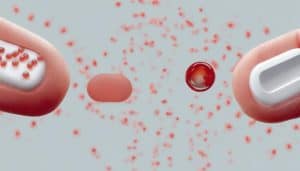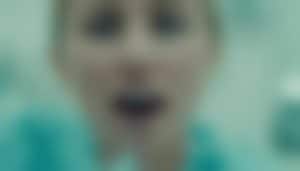When you swallow mouthwash, you're exposing yourself to a toxic mix of chemicals that can cause severe symptoms, ranging from an upset stomach to life-threatening issues like trouble breathing. Even small amounts can be harmful, especially for children under 6 years old. Ingredients like ethanol, hydrogen peroxide, and methyl salicylate can cause nausea, dizziness, and even convulsions. If you've ingested mouthwash, don't hesitate to seek medical attention immediately. It's vital to understand the risks and take preventive measures. To learn more about mouthwash safety and how to protect yourself and your loved ones, keep exploring.
Key Takeaways
• The amount of mouthwash considered dangerous to swallow varies depending on the ingredients and the individual's age and health.
• Even small amounts of mouthwash can be harmful to children, especially those under 6 years old, due to their smaller body size.
• Ingredients like ethanol, hydrogen peroxide, and methyl salicylate can be toxic in large quantities, even for adults.
• Severe symptoms, such as trouble breathing, dizziness, and convulsions, can occur with mouthwash ingestion, requiring immediate medical attention.
• If mouthwash ingestion occurs, do not induce vomiting; instead, rinse the mouth, drink milk, and seek medical advice or visit the emergency room.
Risks of Swallowing Mouthwash
When you swallow mouthwash, you're exposing yourself to a toxic cocktail of chemicals that can wreak havoc on your system. Even swallowing a small amount can lead to symptoms like upset stomach, queasiness, and nausea due to the chemical composition of mouthwash.
However, ingesting large amounts of mouthwash can result in more severe symptoms, such as dizziness, drowsiness, trouble breathing, or convulsions. The ingredients in mouthwash, including fluoride, ethyl alcohol, menthol, eucalyptol, benzoic acid, methyl salicylate, and thymol, can pose risks if swallowed.
It's important to seek immediate medical help if you experience severe symptoms like convulsions or breathing issues after swallowing mouthwash. If you've swallowed mouthwash, it's vital to monitor your symptoms and consult a doctor for guidance.
Ingredients to Watch Out For
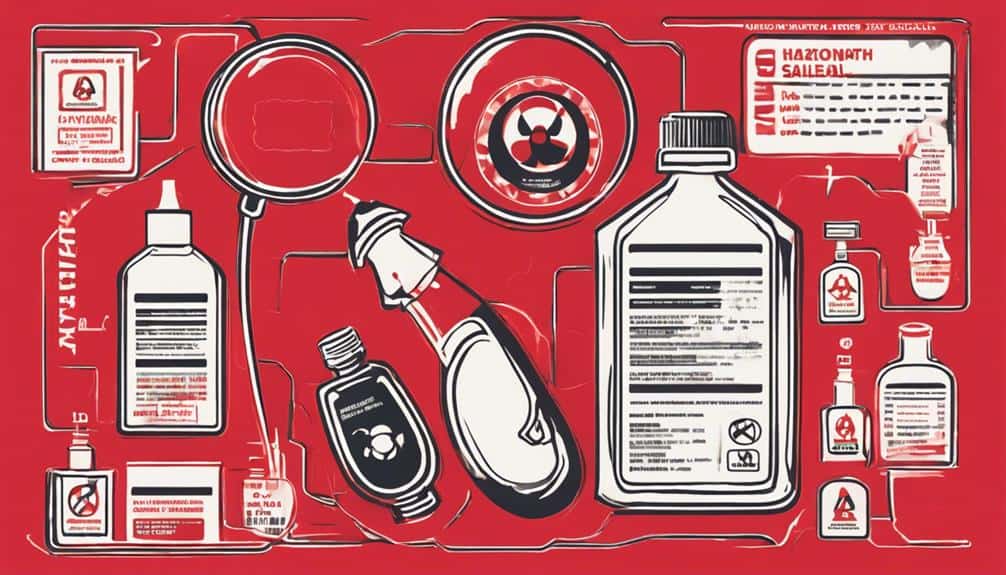
You should be aware of certain mouthwash ingredients that can be harmful if swallowed, including chlorhexidine gluconate, ethanol, hydrogen peroxide, and methyl salicylate. These ingredients can be toxic in large quantities and lead to adverse effects if swallowed. It's essential to check mouthwash labels for these potentially harmful components to prevent accidental ingestion.
Here are some key ingredients to watch out for:
- Chlorhexidine gluconate: Can cause inflammation if swallowed in large amounts.
- Ethanol: Can mimic alcohol intoxication if ingested in significant amounts.
- Hydrogen peroxide: Can be dangerous if ingested in excess, causing gastrointestinal irritation.
- Methyl salicylate: Can be toxic if swallowed in large amounts, leading to adverse effects.
- Other harmful ingredients: Always check the label for other potentially harmful components that can cause harm if swallowed.
Accidental Ingestion in Children
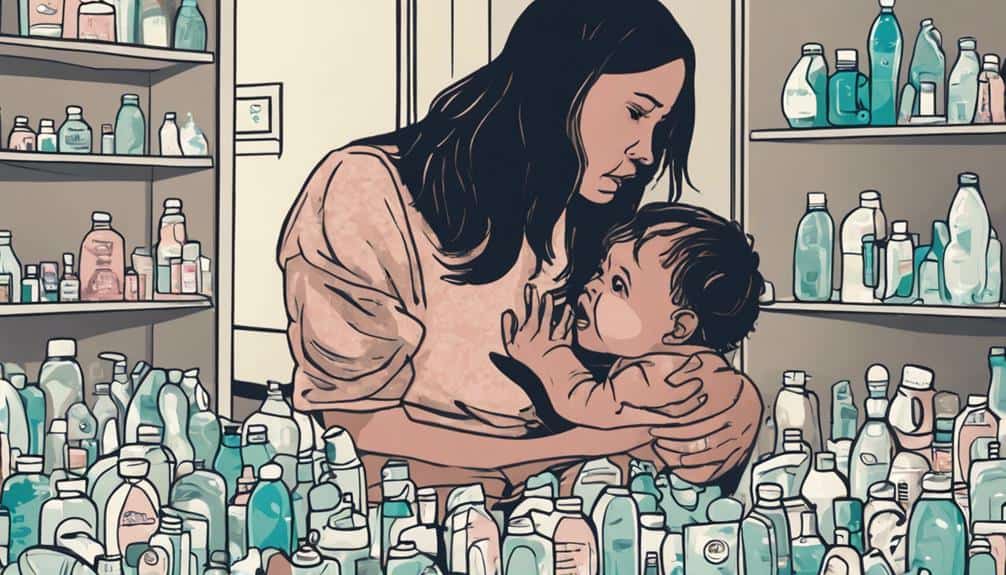
As a parent, you're likely aware that your home can be full of hidden dangers, and mouthwash can be one of them.
You're taking the right step by educating yourself on the risks of accidental ingestion in children, especially when it comes to household hazards like mouthwash.
It's important to recognize the significance of child-resistant packaging in preventing these accidents, and understanding the measures you can take to keep your child safe.
Household Hazards Exist
Hidden dangers lurk in many homes, where mouthwash can become a poisonous threat to young children who accidentally ingest it. As a parent, you may not be aware of the risks that mouthwash poses to your child's health. However, it's essential to take precautions to prevent accidental ingestion, especially in children under 6 years old.
Here are some household hazards to be aware of:
- Accidental ingestion of mouthwash can lead to harmful effects due to their smaller body size and sensitivity.
- Children are more likely to swallow mouthwash during unsupervised oral care routines.
- Improper storage of mouthwash can increase the risk of swallowing.
- Lack of child-resistant packaging can make it easy for children to access mouthwash.
- Delayed medical attention can lead to serious health consequences if a child ingests a significant amount of mouthwash.
Child-Resistant Packaging
Child-resistant packaging serves as an important safeguard against accidental ingestion of mouthwash in children under 6 years old, greatly reducing the risk of harmful consequences.
As a parent or caregiver, you play an essential role in ensuring your child's safety. One effective way to do this is by opting for mouthwash products with child-resistant packaging. These specially designed caps are difficult for young children to open, reducing the risk of unintentional swallowing.
By using child-resistant packaging, you're taking a proactive measure to safeguard against accidental ingestion incidents. In fact, child-resistant closures on mouthwash bottles have become an industry standard for child safety. By choosing products with this feature, you can significantly minimize the chances of accidental swallowing by young children.
Adult Mouthwash Poisoning Symptoms
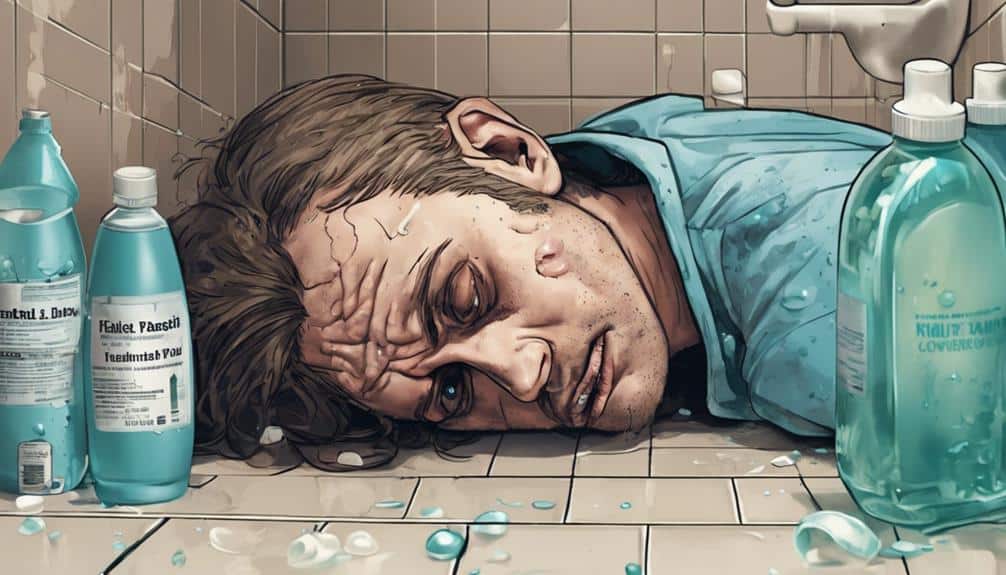
Adults who ingest mouthwash may experience a range of symptoms, including dizziness, drowsiness, trouble breathing, or convulsions, which can vary in severity depending on the amount and type of mouthwash consumed. The consequences of mouthwash ingestion can be severe, and it's vital to recognize the warning signs.
If you've ingested mouthwash, be aware of the following symptoms:
- Dizziness or drowsiness, which can lead to accidents or falls
- Trouble breathing, which can cause respiratory distress
- Convulsions or seizures, which can be life-threatening
- Nausea, vomiting, or gastrointestinal distress, which can lead to dehydration
- Symptoms resembling alcohol intoxication, such as slurred speech or loss of coordination
It's important to monitor yourself or the affected person for these signs of poisoning. If you experience any severe symptoms, seek immediate medical attention. Remember, prompt action can significantly reduce the risk of serious complications.
What to Do in Case of Overdose
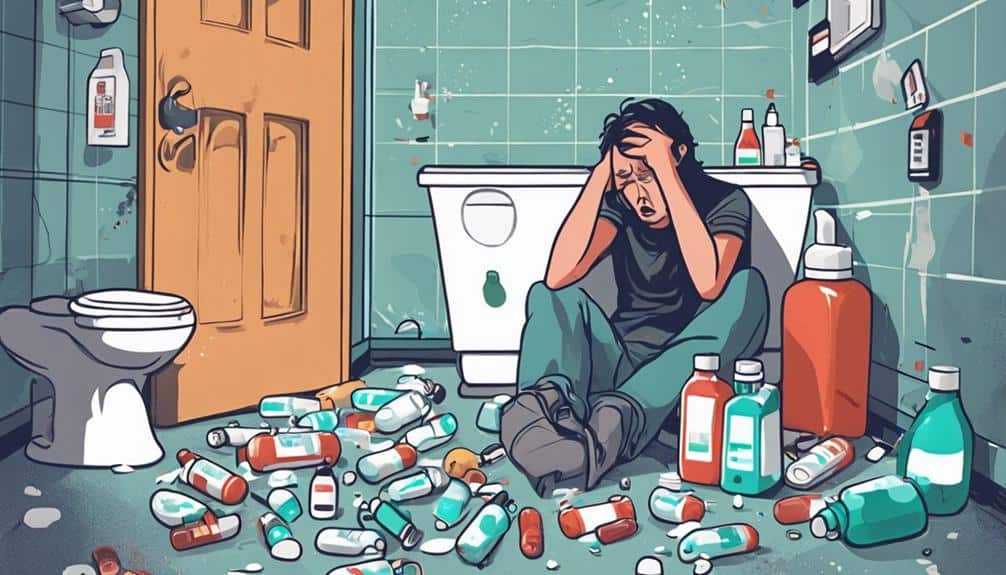
If you suspect you or someone else has overdosed on mouthwash, it's important to recognize the symptoms of overdose. These may include slurred speech, rapid heart rate, and nausea.
You should call emergency services immediately, as prompt medical attention is essential in preventing severe complications. In the hospital, medical professionals will provide treatment to counteract the effects of the overdose, so don't hesitate to seek help.
Symptoms of Overdose
When you accidentally swallow mouthwash, you may exhibit symptoms of overdose, including slurred speech, rapid heartbeat, nausea, vomiting, and difficulty breathing. These symptoms can be severe and even life-threatening, especially in children who are more sensitive to mouthwash than adults.
Here are some common symptoms of mouthwash overdose:
- Slurred speech
- Rapid heartbeat
- Nausea
- Vomiting
- Difficulty breathing
It's essential to recognize these symptoms and act quickly. Do not induce vomiting, as this can worsen the situation.
Instead, rinse your mouth with water, drink milk to help dilute the chemicals, and seek medical help immediately. Remember, prompt medical attention is vital if you've swallowed a large amount of mouthwash, as it can lead to serious consequences.
Don't hesitate to get help – your health depends on it.
Call Emergency Services
In the event of a mouthwash overdose, you should call emergency services immediately to ensure timely medical assistance and guidance on how to proceed. When you call, provide as much information as possible about the swallowed mouthwash, including the brand and quantity consumed. This will help healthcare professionals assess the situation and provide appropriate guidance.
If you've swallowed large quantities of mouthwash, you may experience serious symptoms like dizziness, drowsiness, or trouble breathing. Avoid inducing vomiting after swallowing mouthwash, as this can worsen the situation. Instead, follow the instructions provided by medical experts.
For additional guidance, you can call the Poison Control hotline at 1-800-222-1222. This service is available 24/7 and can provide valuable advice on handling mouthwash ingestion emergencies.
Treatment in Hospital
Hospital treatment for mouthwash overdose typically involves a series of interventions, including close monitoring of your essential signs and performance of diagnostic tests such as x-rays or ECGs. This is important in determining the severity of the overdose and guiding further medical intervention.
If you've ingested a dangerous amount of mouthwash, here's what you can expect during hospital treatment:
- Close monitoring of essential signs to track any changes in your condition
- Administration of IV fluids, medications, or activated charcoal to counteract the effects of the mouthwash
- Performance of breathing support or kidney dialysis in severe cases
- Bringing the mouthwash container to the hospital to help medical professionals identify the ingested substances
- Hospital admission for close monitoring and management of symptoms
Emergency Room Protocol
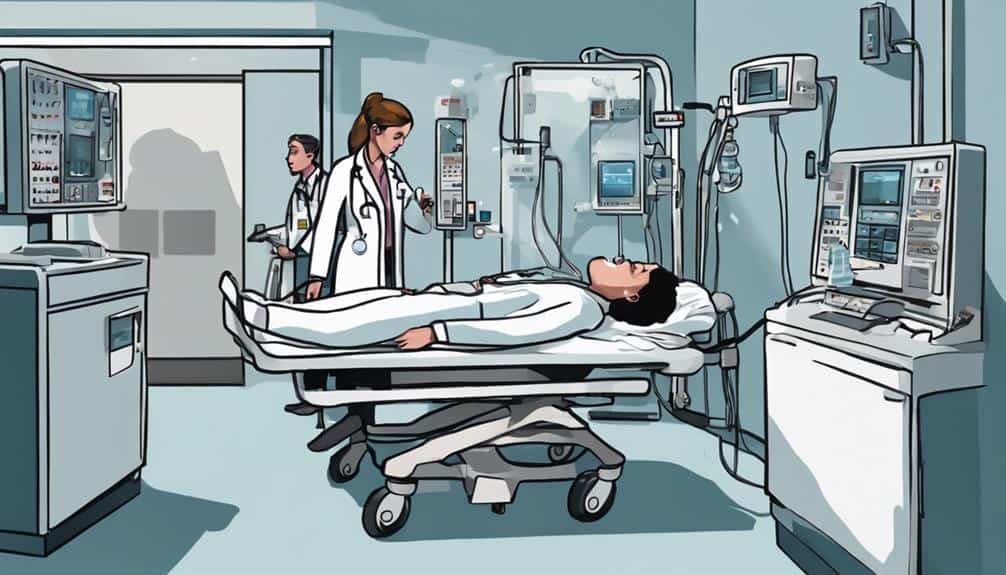
Upon arrival at the emergency room, you'll undergo immediate evaluation and treatment, with medical professionals closely monitoring your essential signs and potentially conducting diagnostic tests like x-rays.
It's important to bring the mouthwash container with you, as this will help medical staff identify the ingredients and determine the best course of treatment.
In the emergency room, your vital signs, such as heart rate and breathing, will be closely monitored. Depending on the severity of your condition, you may receive treatments like IV fluids, medications, activated charcoal, or breathing support.
In severe cases, hospital admission may be necessary for further monitoring and care. The prognosis after swallowing mouthwash depends on the amount ingested, the speed of treatment, and individual health factors.
It's critical to seek immediate medical attention if you've ingested mouthwash, as prompt treatment can greatly improve outcomes.
Preventing Mouthwash Poisoning
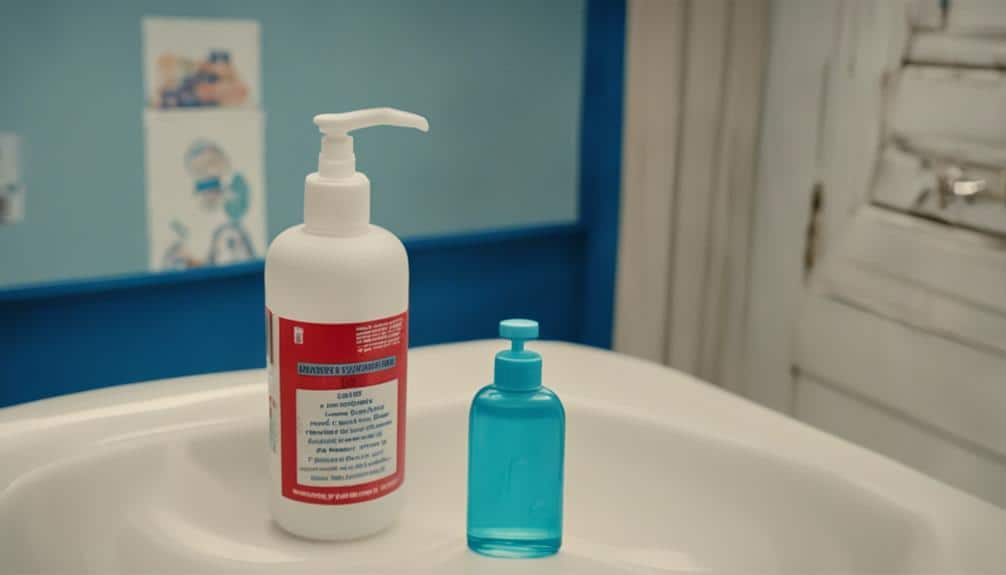
By taking proactive steps to prevent mouthwash poisoning, you can minimize the risk of accidental ingestion and guarantee a safe oral care routine. It's important to prioritize caution when using mouthwash, as swallowing even a small amount can be harmful.
To prevent yourself or others from accidentally swallowing mouthwash, follow these essential guidelines:
- Store mouthwash out of reach of children to prevent accidental ingestion.
- Educate family members about the dangers of swallowing mouthwash.
- Use child-resistant caps on mouthwash bottles as an added safety measure.
- Establish a safe oral care routine to minimize the risk of mouthwash poisoning.
- Stay vigilant and avoid distractions during oral hygiene practices to prevent accidents.
Safe Storage and Handling Tips
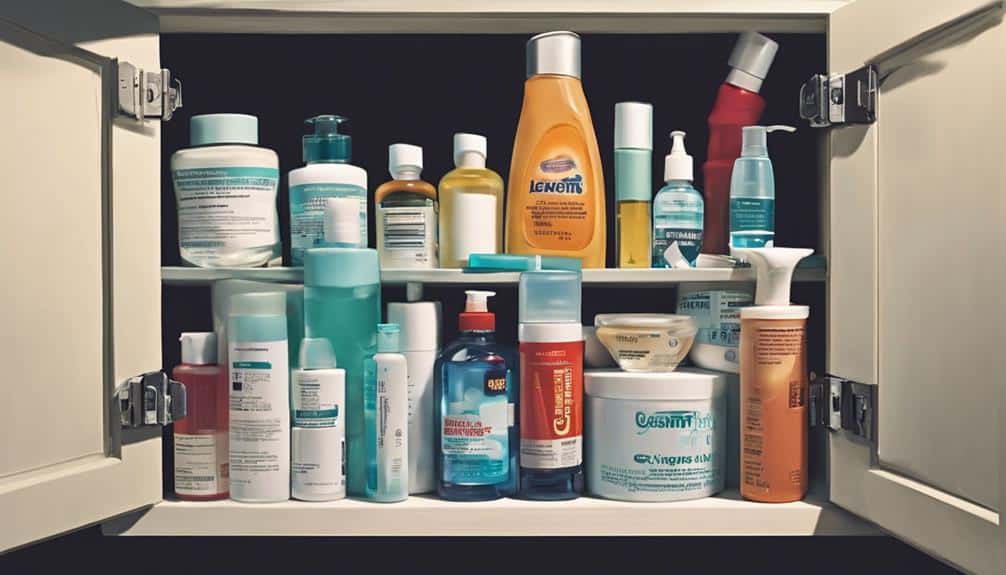
To guarantee safe storage and handling of mouthwash, store the bottle in a secure location where children can't access it, and always keep it upright to prevent accidental spills. You should also consider using child-resistant caps on mouthwash bottles for added safety.
It's important to educate your family members, especially children, about the potential dangers of swallowing mouthwash, as even a small amount can be harmful. Establish a safe oral care routine to minimize the risk of swallowing mouthwash. Avoid distractions during oral hygiene practices, and focus on safe handling of mouthwash to prevent accidents.
Mouthwash Overdose Treatment Options
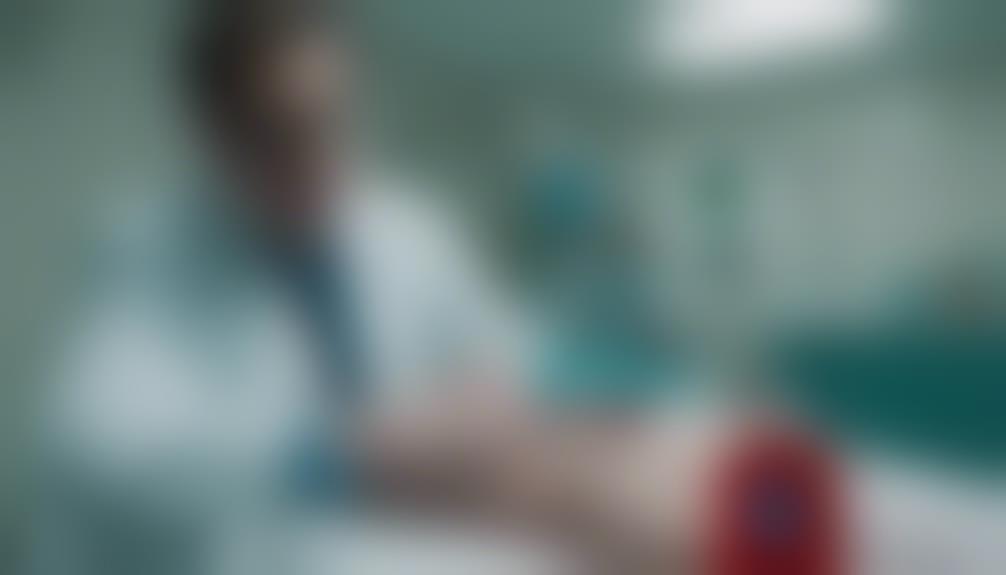
If you've swallowed mouthwash, don't delay – rush to seek medical attention, as immediate treatment can significantly reduce the risk of severe complications. Prompt medical assistance is essential in cases of mouthwash overdose to prevent potential serious outcomes and guarantee proper management of symptoms.
Treatment options for mouthwash overdose may include:
Monitoring vital signs** to track your condition
Administering IV fluids** to prevent dehydration
Providing medications** to alleviate symptoms like dizziness and drowsiness
Offering activated charcoal** to absorb the toxins
Supporting breathing if necessary**, in severe cases
Medical professionals may conduct tests like x-rays or ECGs to assess the extent of mouthwash ingestion and determine appropriate treatment measures. In severe cases, hospital admission may be required for closer monitoring and advanced care interventions.
Treatment for mouthwash overdose aims to address symptoms like trouble breathing and other complications resulting from ingesting excessive amounts of mouthwash.
When to Seek Medical Attention
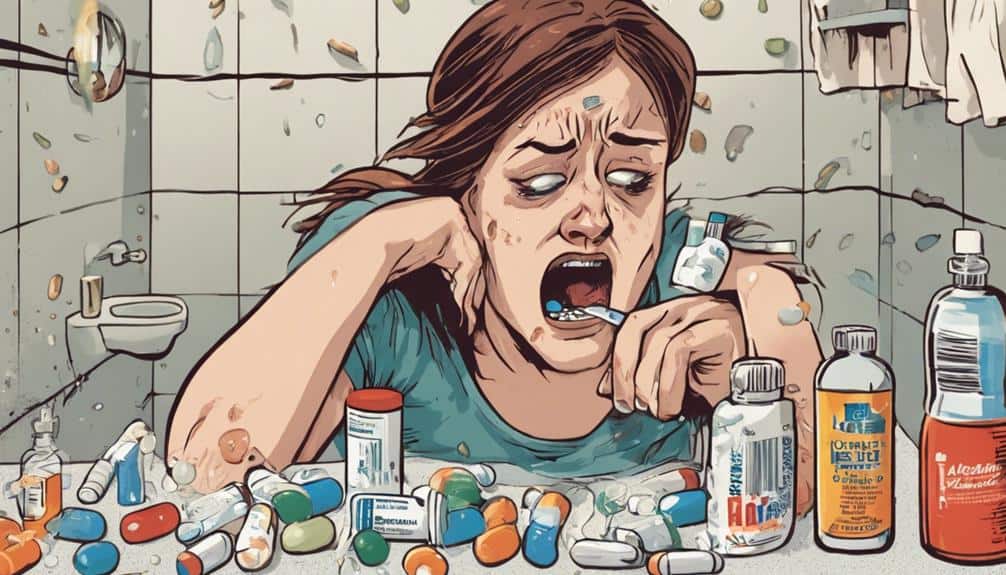
You should seek immediate medical attention if you experience severe symptoms, such as dizziness, trouble breathing, or convulsions, after swallowing mouthwash. These symptoms can be life-threatening, so don't hesitate to get help.
If you've swallowed a large amount of mouthwash, especially if you're a child, you should contact Poison Control or visit the emergency room right away. It's essential to get medical help quickly if you're experiencing serious effects from mouthwash ingestion, such as alcohol intoxication or toxicity from harmful ingredients.
Do not try to induce vomiting if you or someone else has swallowed mouthwash. Instead, rinse your mouth, drink milk, and seek professional medical advice promptly.
It's also important to monitor yourself or the affected person for persistent symptoms like queasiness, diarrhea, or dizziness. If you experience any of these symptoms, don't delay seeking medical attention.
Frequently Asked Questions
How Much Mouthwash Is Dangerous to Swallow?
When you wonder how much mouthwash is dangerous to swallow, remember that it depends on your age, weight, and the ingredients in the mouthwash.
Generally, small amounts are safe, but larger quantities can be harmful, especially for kids.
If you or a child ingests a significant amount, seek medical help right away to prevent complications.
Can I Swallow My Saliva After Mouthwash?
As you rinse with mouthwash, a fleeting worry whispers in your ear: 'Can I swallow my saliva after mouthwash?' Fear not, dear innovator! Swallowing saliva post-mouthwash is a harmless habit.
The tiny remnants of mouthwash in your saliva are diluted to the point of insignificance, and your body can handle it.
What Happens if You Swallow Chlorhexidine Mouthwash?
Seeking immediate medical attention is crucial if you swallow chlorhexidine mouthwash.
Ingesting large amounts can result in nausea, vomiting, and abdominal pain, and in severe cases, it may cause low blood pressure and breathing difficulties.
Remember to rinse your mouth with water to reduce harm, as chlorhexidine is an antiseptic meant to eliminate bacteria, not for human consumption.
What Happens if You Accidentally Swallow Biotene?
Imagine accidentally sipping a mysterious potion, Biotene mouthwash, designed to soothe your dry mouth. What happens if you swallow it?
Don't panic! In small amounts, it's generally safe, but you might experience mild symptoms like an upset stomach or nausea. These temporary discomforts will pass, but if you've swallowed a large amount or have severe symptoms, seek medical advice.
